高考复习高一下英语词组和语法重难点[下学期]
图片预览
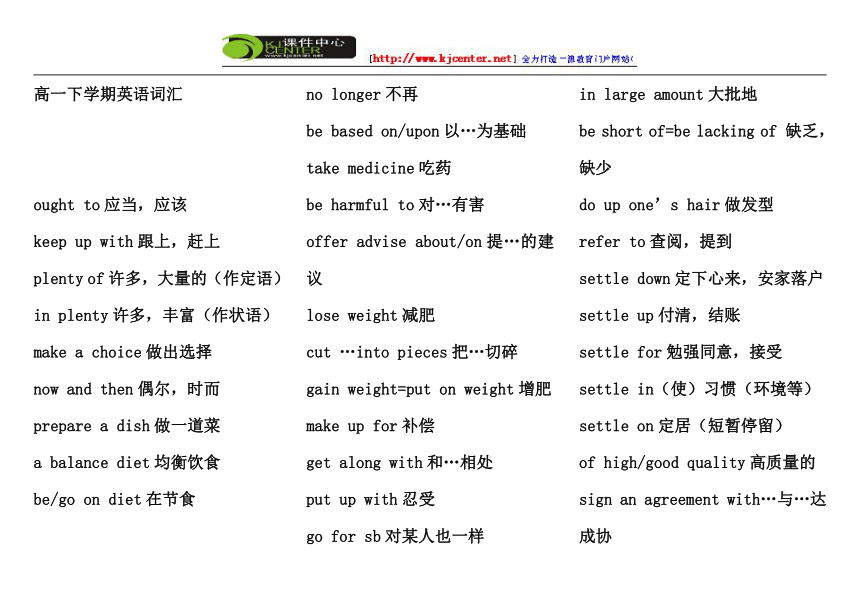
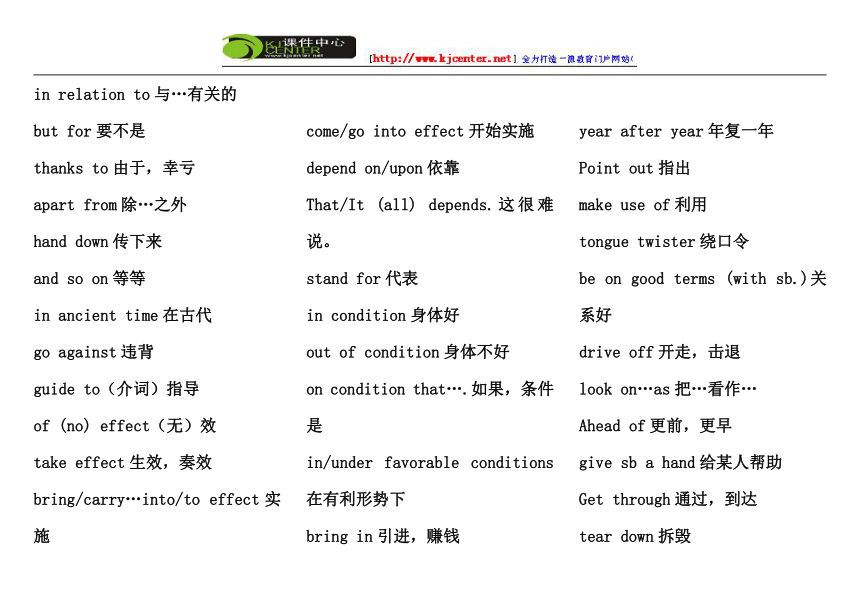
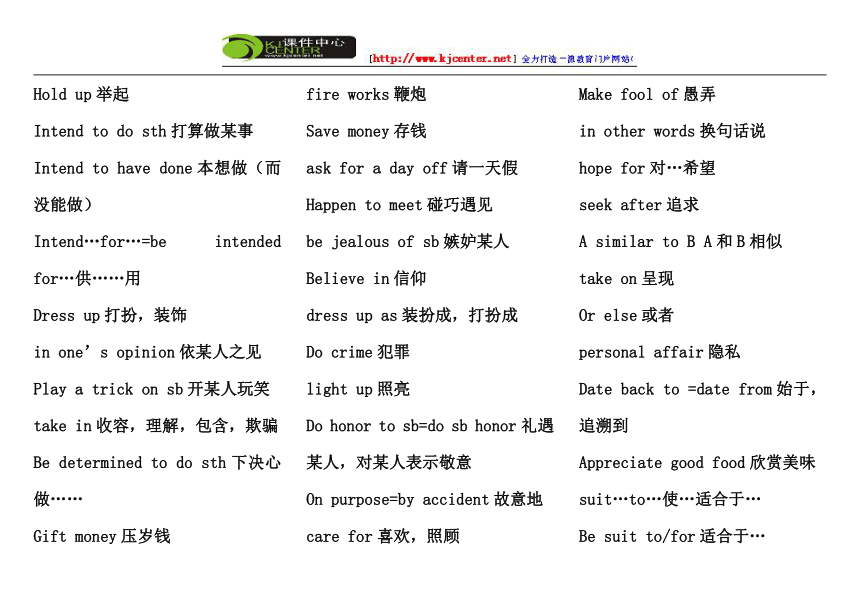
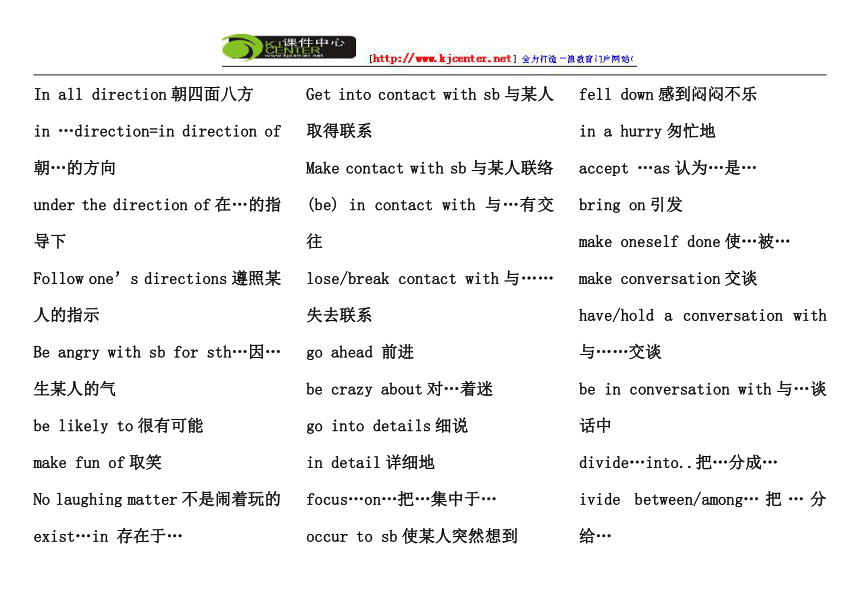
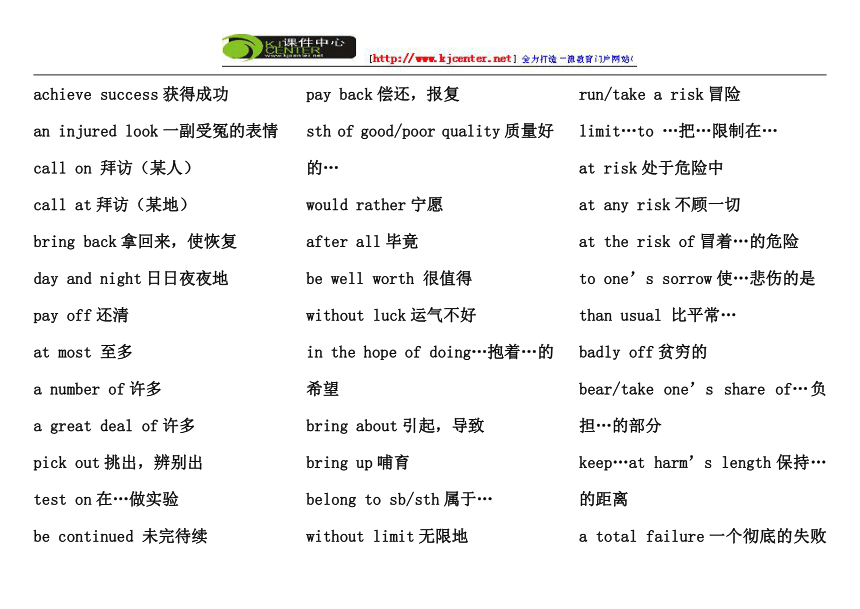
文档简介
高一下学期英语词汇
ought to应当,应该
keep up with跟上,赶上
plenty of许多,大量的(作定语)
in plenty许多,丰富(作状语)
make a choice做出选择
now and then偶尔,时而
prepare a dish做一道菜
a balance diet均衡饮食
be/go on diet在节食
no longer不再
be based on/upon以…为基础
take medicine吃药
be harmful to对…有害
offer advise about/on提…的建议
lose weight减肥
cut …into pieces把…切碎
gain weight=put on weight增肥
make up for补偿
get along with和…相处
put up with忍受
go for sb对某人也一样
in large amount大批地
be short of=be lacking of 缺乏,缺少
do up one’s hair做发型
refer to查阅,提到
settle down定下心来,安家落户
settle up付清,结账
settle for勉强同意,接受
settle in(使)习惯(环境等)
settle on定居(短暂停留)
of high/good quality高质量的
sign an agreement with…与…达成协
in relation to与…有关的
but for要不是
thanks to由于,幸亏
apart from除…之外
hand down传下来
and so on等等
in ancient time在古代
go against违背
guide to(介词)指导
of (no) effect(无)效
take effect生效,奏效
bring/carry…into/to effect实施
come/go into effect开始实施
depend on/upon依靠
That/It (all) depends.这很难说。
stand for代表
in condition身体好
out of condition身体不好
on condition that….如果,条件是
in/under favorable conditions在有利形势下
bring in引进,赚钱
year after year年复一年
Point out指出
make use of利用
tongue twister绕口令
be on good terms (with sb.)关系好
drive off开走,击退
look on…as把…看作…
Ahead of更前,更早
give sb a hand给某人帮助
Get through通过,到达
tear down拆毁
Hold up举起
Intend to do sth打算做某事
Intend to have done本想做(而没能做)
Intend…for…=be intended for…供……用
Dress up打扮,装饰
in one’s opinion依某人之见
Play a trick on sb开某人玩笑
take in收容,理解,包含,欺骗
Be determined to do sth下决心做……
Gift money压岁钱
fire works鞭炮
Save money存钱
ask for a day off请一天假
Happen to meet碰巧遇见
be jealous of sb嫉妒某人
Believe in信仰
dress up as装扮成,打扮成
Do crime犯罪
light up照亮
Do honor to sb=do sb honor礼遇某人,对某人表示敬意
On purpose=by accident故意地
care for喜欢,照顾
Make fool of愚弄
in other words换句话说
hope for对…希望
seek after追求
A similar to B A和B相似
take on呈现
Or else或者
personal affair隐私
Date back to =date from始于,追溯到
Appreciate good food欣赏美味
suit…to…使…适合于…
Be suit to/for适合于…
In all direction朝四面八方
in …direction=in direction of朝…的方向
under the direction of在…的指导下
Follow one’s directions遵照某人的指示
Be angry with sb for sth…因…生某人的气
be likely to很有可能
make fun of取笑
No laughing matter不是闹着玩的
exist…in 存在于…
Get into contact with sb与某人取得联系
Make contact with sb与某人联络
(be) in contact with 与…有交往
lose/break contact with与……失去联系
go ahead 前进
be crazy about对…着迷
go into details细说
in detail详细地
focus…on…把…集中于…
occur to sb使某人突然想到
fell down感到闷闷不乐
in a hurry匆忙地
accept …as认为…是…
bring on引发
make oneself done使…被…
make conversation交谈
have/hold a conversation with与……交谈
be in conversation with与…谈话中
divide…into..把…分成…
ivide between/among…把…分给…
achieve success获得成功
an injured look一副受冤的表情
call on 拜访(某人)
call at拜访(某地)
bring back拿回来,使恢复
day and night日日夜夜地
pay off还清
at most 至多
a number of许多
a great deal of许多
pick out挑出,辨别出
test on在…做实验
be continued 未完待续
pay back偿还,报复
sth of good/poor quality质量好的…
would rather宁愿
after all毕竟
be well worth 很值得
without luck运气不好
in the hope of doing…抱着…的希望
bring about引起,导致
bring up哺育
belong to sb/sth属于…
without limit无限地
run/take a risk冒险
limit…to …把…限制在…
at risk处于危险中
at any risk不顾一切
at the risk of冒着…的危险
to one’s sorrow使…悲伤的是
than usual 比平常…
badly off贫穷的
bear/take one’s share of…负担…的部分
keep…at harm’s length保持…的距离
a total failure一个彻底的失败者
save the situation收拾局面
trade in以交方式购入
trade with从事贸易
be popular with受…的欢迎
culture of mind and body身心修养
(be)of (no) use有(无)用
put…to use利用
to one’s knowledge 据某人所知
express oneself表达自己的意思
tell…from…把…和…分开
means of transport交通方式
together with=as well as也
against to the wall靠着墙
without a sound悄无声息地
pull out把…拉上来
not later than不迟于
get close to接近…
just as 恰如
without turning a hair毫不畏惧
in disorder混乱
be familiar with 熟悉
rushed off one’s feet忙于工作
at work忙于工作
n the go奔波
go through with 完成
at one go一口气
miss one’s turn 错过
be devoted to sb喜欢某人
to…degree 达到…程度
succeed in doing sth成功的做了某事
do about处理 应付
clear away清除打扫
go out熄灭
push open推开
be up to sb 由某人决定
tire out筋疲力尽
not a bit = not at all一点也不
there is no doubt毫无疑问
be willing to do = like to do愿意
a number of 若干 ,一些
the rule of conduct行为准则
charge a pipe给烟斗塞烟
be charged with充满……
tear at sth撕扯……
fasten…to…把…拴在…上
explain sth to sb = explain to sb sth向某人解释某事
fasten one’s eyes to sb眼睛盯着某人
in tears哭泣,掉泪
end in a tie以平局结束
in your own words用你自己的话
come into use开始使用
can’t help doing忍不住
stop…from doing阻止
leave sth done 让……做……
by choice 出于选择
for choice要选就选
ask after sb问候某人
give away赠出,让出
set the scene为某事做准备
full dress盛装
a pieces of jewellery一件珠宝
look about/around 警戒
look on旁观
look through浏览
look up to尊敬
act for代理
act on/upon对……起作用
know of听说过
by chance偶然地
by mistake由于疏忽
be in use在使用中
make a great discovery完成一项重大任务
bring…to use= put …to use加以利用
call sb names谩骂某人
in the name of以……的名字
in change主管
free of change免费
at one’s own change自费
out of control失去控制
be particular about对…挑剔
knock over撞翻
lay down one’s life献出生命
a man of name知名人士
turn in归还,交上
carry on research进行研究
take up research开始研究
act against违反
speak against发表抨击
little by little逐渐地
out of date这时的
up to date最新式的
to date 到目前为止
put a date to sth注明日期
set/fix the date确定日期
keep a date赴约
go off 出发,爆发(机器等停止)
go into详细调查
go by 走过,……流逝
go beyond超越
go about 四处走走,开始
around the corner即将来临,在拐角处
die down平息
come to terms with甘心忍受
what else而且
be about to即将开始
at the top of one’s voice大声地
self rescue自救
be mean with对…吝啬
take shelter躲避
work with sb对……起作用
smell of闻出……的味道
break up弄碎
hold up阻滞
a threatening letter恐吓信
somehow or other设法,想办法
admire sb as…钦佩某人是…
admire sb for sth 钦佩某人的…
admire oneself in the mirror照镜子
rise/come to fame 成名
opposite to 在…对面
to one’s regret 使某人遗憾的是
be surrounded with/by被…围绕
get/gain/take possession of占有,占领
make up组成,构成,凑足
turn to转向,求助于
go sailing 驾船航行
go camping宿营
come into one’s possession被某人占有
in one’s possession=in the possession of sb被某人据有
(be) in possession of持有,拥有
零 散 记 忆
only+介词短语(方式状语)+倒装句
e.g.: Only in this way will we be ready for the…
the only/just/very/first + n.+ that(who)+定从
当n.为物时只用that,当n.为人时只用who。
be of + 抽象名词,表“具有……”
begin to do 和begin doing
一般情况下意思相同,但 1)begin为现在进行时时;
2)当begin后为think,realise等类词时,只用to do。
Make it (F.O) +adj+to do sth.
To,on,in 在表方位时:
on表接壤 2)in在范围之内 3)to不接壤
7、hope: 1)+that-clause 2)+to do 3)+for sth
a/the way (that) +定语从句
to do 和v-ing 做主语和宾语:
to do一次性和具体性;v-ing表经常性延续性
so…that… “如此…以致于…”引导结果状从句。
So…部分放在句首时,句子要倒装
比较:so…that…和such…that…的句型构成
so+adj./adv.+that… such+a(n)+adj.+n.+that…
such+adj.+U.C.N.+that…
such+n.(pl.)+that…
with+宾+宾补(形容词、介词短语、副词、分词、不定式),在句中状语或定语
12、a great many+n.(pl.),当此名词前有限定词如the ,these,those等,则用a great many of
13、系表结构 stay+adj. 一直保持某种状态
14、only to do sth 这一结构常作结果状语,用以指随即发生的意料之外的事,有“反而,却”之意。
15、 advise(n. advice) “建议,忠告”
1)advise+n./pron. 2)advise sb. (not) to do sth
3)advise doing sth 4)advise sb.+clause(虚拟语气)
16、the reason 与for连用表语从句只用that引导
17、used to:
used not to +动词原形=usedn’t to+动词原形
did not use to+动词原形=didn’t use to+动词原形
used+主+to+动词原形
did+主+use to+动词原形
It seems to that…
18、seem It seems as if/though…
There seems (to be)…
19、Seem,that和appear
三词后均可加形容词、副词、分词等;
appear,seem后可接to do ,而look后只加to be
look后只可接as if引导的从句,不能接that 从句
20、accept
n./pron 接受……
sb/sth+as+n./adj.把……视为,接受……
that-clause 承认
21、worth与worthy
n.值多少钱 of sth值得,配得上
be worth+ be worthy + of being值得做
doing 值得的 to be done值得做
22、 a.have sb doing 使某人做某事,表动作一直进行
b.have sb do 使某人做某事,表动作完成或可能发生
c.have sth to do 有某事要做,have意为“有,拥有”
d. have sth done 使某事被做,done表被动动作
23、表“许多大量”的几个词组:
a great/good many
a large/great/good number of +可数名词
a good few/quite few
many a
a great/good deal of
a large/great amount of +不可数名词
quite a little
a lot of/lots of
a large/great quantity of +可数名词或
large quantities of 不可数名词
plenty of
24、keep doing sth.一直干,后跟状态性动词
keep on doing sth.反复干……,强调动作的重复
25、It is…for sb to do sth
It is…that-clause
26、happen
主(人)+happens+to do
It(形主) +(so)happen +that-clause
27、allow(vt.)
a. allow+ 名/形 b. allow+含有不定式的复合宾语
c. allow+动名词 d. allow+sb.+介词短语/副词
28、连系动词的分类:
变化类:become,go,get,grow,fall,turn ect.
感官类:fell,smell,taste,look,sound ect.
显现类:appear,seem,look ect.
状态类:keep,stay,come,stand ect.
29、though相当于however ,用于句末。
30、动词+to构成的短语:
look forward to盼望… turn to求助于,转向
pay attention to注意 stick to坚持
get down to开始认干 object to反对
belong to属于 refer to涉及,谈到
point to指向 see to处理,料理
come to共计,苏醒 reply to答复
agree to同意 add to增加
devote…to…贡献…给… compare…to…把…比作…
高一下学期语法重难点集汇
主谓一致
主谓一致是指一个句子的主语和谓语动词保持数的一致关系。一个句子中主谓一致,通常指三个基本原则:语法一致,即形式上一致;概念一致,即概念或意念上的一致;毗邻一致,即谓语动词的形式与邻近的名词一致。
语法一致原则
在通常情况下,一个句子的主语和谓语在语法形式上保持一致。即主语为单数形式,谓语也为单数形式;主语为复数形式,谓语也为复数形式。如:
This exercise on English idioms is not easy.这个英语短语练习不容易。
在“there be”结构中, “be”的单复数取决与后面主语的数.如:
There has been little change in this city.这个城市没有多少变化。
3、“one of”结构,位于用单数,“two of”结构位于用复数
One of the things I want to do is traveling.我想做的一件事是去旅行。
Two of the boys have lost their way home.有两个男孩回家迷路了。
倒装句的主语在谓语之后,避免误用。
Never before has she been to Paris!她以前从未去过巴黎。
概念一致
主语是抽象概念、短语或从句,谓语用单数形式。如:
To tell lies is wrong.说谎是不正确的。(不定式做主语)
Keeping the house is a tiring job.管理家务是一件很劳累的事。(动名词做主语)
How this happened is not clear to anyone.(从句做主语)
注意:
用what或which引导的主语从句或简单句中的数的概念取决于后面的表语,因为它们在逻辑上的意义是相同的。如:
Which is your seat 你的座位是哪一个?
Which are your seats 你们的座位是哪些?
单个的分词作主语,不定式作主语,以及主语从句,谓语都用单数,若用连接上述的相同两个成分,谓语才用复数。
两个或两个以上的主语用and和both连接时,谓语用复数形式。
and连接的并列主语指同一人或同一样东西,and后的名词前没有冠词,谓语用单数;若有,则用复数。如:
My best friend and adviser has changed his mind again.我的密友兼顾问又改变他的想法了。
My friend and the student Sue are in the classroom.我的朋友和那位叫苏的同学在教室里。
若and后面加not,谓语用单数。如:
Lilei,and not I, has won the game.是 Lilei赢了比赛,而不是我。
用and 连接的单数主语,前面有each,every,many a,no等词修饰时,谓语用单数。
复数主语前加each,谓语仍用复数。
no后面名词为单数,谓语用单数;后为复数,谓语用复数。
毗邻一致
由not only…but also,neither…nor…,either…or…,or 连接的并列主语,在肯定句中谓语变化取决于后面的饿主语,在疑问句中取决于前面的主语。如;
Either he or I am mistaken.他和我都没错。
Either he or you are to go there.不是他就是你要到那儿去。
(详见高一下册P155~P156)
虚拟语气
虚拟语气表示说话人的愿望、假设、猜测或建议,而不是事实。虚拟语气是通过句中的谓语动词的特殊形式来表现的,因此,掌握虚拟语气中的各种谓语动词的形式变化,是掌握虚拟语气的关键。
虚拟语气在简单句中的用法
虚拟语气用于简单句中,一般表示祝愿、命令等。谓语动词要用原形。
虚拟语气在主从复合句中的用法
在状语从句中的用法
条件句中的用法
虚拟语气的条件句是用谓语动词的特殊形式来表现与现在、过去事实相反的情况或对将来发生的情况表示怀疑,和直陈语气条件句中的谓语动词形式以及表达的含义完全不同。虚拟语气条件句中所用的谓语动词的过去时、过去完成时、过去将来时等,只表示不同的虚拟语气,和直陈语气的过去时、过去完成时、过去将来时等毫无关系。
现将虚拟语气的各种具体形式和用法分述如下;
表示与现在事实相反的情况
①形式
条件从句的动词形式 主句的动词形式
If I (we,you,he,she,it,they)+行为动词的过去式(be的过去式一般用were) I (we) shouldYou (he,she , +动词原形或:they,it ) would 所有人称+might(could)+动词原形
②用法:
If I had more time, I should study German.(fact:I have no more time, so I shall not study German. )
If she were not so busy, she would attend the meeting this afternoon.(fact:she is very busy, so she will not attend the meeting this afternoon.)
If they didn’t take physical exercises every day, they wouldn’t be so healthy.(fact: they take physical exercises every day, so they are very healthy.)
表示与过去誓死相反的情况
①形式;
条件从句的动词形式 主句的动词形式
If I (we,you,he,she,it,they)+had+过去分词 I (we) shouldYou (he,she , +have+过去分词或:they,it ) would 所有人称+could(might)+have+过去分词
②用法:
I would have checked my paper again if I had had more time at yesterday’s examination.(fact:I had no more time at yesterday’s exam, so I didn’t check my paper again)
You would have already recovered from his illness if he had seen the doctor in good time.(fact: He didn’t see the doctor in good time ,so he hasn’t recovered from his illness )
表示与将来事实相反的情况
①形式:
条件从句的动词形式 主句的动词形式
If I (we,you,he,she,it,they)+行为动词的过去式(be的过去式一般用were)通常要与一个表将来的时间的状语连用If (we,you,he,she,it,they)+should+动词原形c. If I (we,you,he,she,it,they)+were to+动词原形 I (we) shouldYou would +动词原形或:he(she,it ) would they wouldI (we,you,he,she,it,they)+could(might)+动词原形
②用法:
If it rains tomorrow, our picnic will be put off.(The weather has been changeable these days.)
If it rained tomorrow, our picnic would be put off.( The weather has beenvery good these days.)
If it should rain tomorrow, our picnic would be put off.(That would be out of our expectation.)
If it were to rain tomorrow, our picnic would be put off. (条件从句谓语动词用were to +动词原形,表示 下雨的可能性极小。Were to rain和should rain 都表示“出乎意料之外”,但were to加强表示“当初没想到以后的事”)
混合时间条件句的用法:
有时条件从句的动作和主句动作发生的 时间不一致。这时动词的形式,应根据它所要表达的具体时间来决定用什么形式。
If she hadn’t trained so hard, she wouldn’t be run so fast.(从句叙述过去,主句叙述现在。)
(fact: she has trained very hard, so she would able to run fast.)
You would speak English well enough if you had practised reading and speaking it every day.(主句叙述现在,从句叙述过去)
(fact: You didn’t practice (hasn’t practiced ) reading and speaking it every day, so you can’t speak English well enough.)
在其他状语从句中的用法
主要用于由as if (as though) 引导的比较状语从句,从句中谓语动词一般用“动词的过去式(be 变were )或had +过去分词。”
如:
She looked as if she were ill.(实际上她没有病,在这里用虚拟语气补语比喻她精神不佳)
Xiao Liu speaks English so well as if he had studied in England.(这里用虚拟语气表现他的 英语说得好)
(2)、在主语从句中的用法:
通常由形式主语it引出的主语从句来表达。主语从句中,谓语动词用“should+动词原形”;表示“必要”“重要”“奇怪”等意思。
It is necessary that you should clean the workshop after work.下班后你必须清扫车间。
It is important that we should ask advice of other people about our work.在工作中,征求别人的意见是很重要的。
在宾语从句中的用法(详见《高一上学期英语语法重难点集汇》)
PAGE
ought to应当,应该
keep up with跟上,赶上
plenty of许多,大量的(作定语)
in plenty许多,丰富(作状语)
make a choice做出选择
now and then偶尔,时而
prepare a dish做一道菜
a balance diet均衡饮食
be/go on diet在节食
no longer不再
be based on/upon以…为基础
take medicine吃药
be harmful to对…有害
offer advise about/on提…的建议
lose weight减肥
cut …into pieces把…切碎
gain weight=put on weight增肥
make up for补偿
get along with和…相处
put up with忍受
go for sb对某人也一样
in large amount大批地
be short of=be lacking of 缺乏,缺少
do up one’s hair做发型
refer to查阅,提到
settle down定下心来,安家落户
settle up付清,结账
settle for勉强同意,接受
settle in(使)习惯(环境等)
settle on定居(短暂停留)
of high/good quality高质量的
sign an agreement with…与…达成协
in relation to与…有关的
but for要不是
thanks to由于,幸亏
apart from除…之外
hand down传下来
and so on等等
in ancient time在古代
go against违背
guide to(介词)指导
of (no) effect(无)效
take effect生效,奏效
bring/carry…into/to effect实施
come/go into effect开始实施
depend on/upon依靠
That/It (all) depends.这很难说。
stand for代表
in condition身体好
out of condition身体不好
on condition that….如果,条件是
in/under favorable conditions在有利形势下
bring in引进,赚钱
year after year年复一年
Point out指出
make use of利用
tongue twister绕口令
be on good terms (with sb.)关系好
drive off开走,击退
look on…as把…看作…
Ahead of更前,更早
give sb a hand给某人帮助
Get through通过,到达
tear down拆毁
Hold up举起
Intend to do sth打算做某事
Intend to have done本想做(而没能做)
Intend…for…=be intended for…供……用
Dress up打扮,装饰
in one’s opinion依某人之见
Play a trick on sb开某人玩笑
take in收容,理解,包含,欺骗
Be determined to do sth下决心做……
Gift money压岁钱
fire works鞭炮
Save money存钱
ask for a day off请一天假
Happen to meet碰巧遇见
be jealous of sb嫉妒某人
Believe in信仰
dress up as装扮成,打扮成
Do crime犯罪
light up照亮
Do honor to sb=do sb honor礼遇某人,对某人表示敬意
On purpose=by accident故意地
care for喜欢,照顾
Make fool of愚弄
in other words换句话说
hope for对…希望
seek after追求
A similar to B A和B相似
take on呈现
Or else或者
personal affair隐私
Date back to =date from始于,追溯到
Appreciate good food欣赏美味
suit…to…使…适合于…
Be suit to/for适合于…
In all direction朝四面八方
in …direction=in direction of朝…的方向
under the direction of在…的指导下
Follow one’s directions遵照某人的指示
Be angry with sb for sth…因…生某人的气
be likely to很有可能
make fun of取笑
No laughing matter不是闹着玩的
exist…in 存在于…
Get into contact with sb与某人取得联系
Make contact with sb与某人联络
(be) in contact with 与…有交往
lose/break contact with与……失去联系
go ahead 前进
be crazy about对…着迷
go into details细说
in detail详细地
focus…on…把…集中于…
occur to sb使某人突然想到
fell down感到闷闷不乐
in a hurry匆忙地
accept …as认为…是…
bring on引发
make oneself done使…被…
make conversation交谈
have/hold a conversation with与……交谈
be in conversation with与…谈话中
divide…into..把…分成…
ivide between/among…把…分给…
achieve success获得成功
an injured look一副受冤的表情
call on 拜访(某人)
call at拜访(某地)
bring back拿回来,使恢复
day and night日日夜夜地
pay off还清
at most 至多
a number of许多
a great deal of许多
pick out挑出,辨别出
test on在…做实验
be continued 未完待续
pay back偿还,报复
sth of good/poor quality质量好的…
would rather宁愿
after all毕竟
be well worth 很值得
without luck运气不好
in the hope of doing…抱着…的希望
bring about引起,导致
bring up哺育
belong to sb/sth属于…
without limit无限地
run/take a risk冒险
limit…to …把…限制在…
at risk处于危险中
at any risk不顾一切
at the risk of冒着…的危险
to one’s sorrow使…悲伤的是
than usual 比平常…
badly off贫穷的
bear/take one’s share of…负担…的部分
keep…at harm’s length保持…的距离
a total failure一个彻底的失败者
save the situation收拾局面
trade in以交方式购入
trade with从事贸易
be popular with受…的欢迎
culture of mind and body身心修养
(be)of (no) use有(无)用
put…to use利用
to one’s knowledge 据某人所知
express oneself表达自己的意思
tell…from…把…和…分开
means of transport交通方式
together with=as well as也
against to the wall靠着墙
without a sound悄无声息地
pull out把…拉上来
not later than不迟于
get close to接近…
just as 恰如
without turning a hair毫不畏惧
in disorder混乱
be familiar with 熟悉
rushed off one’s feet忙于工作
at work忙于工作
n the go奔波
go through with 完成
at one go一口气
miss one’s turn 错过
be devoted to sb喜欢某人
to…degree 达到…程度
succeed in doing sth成功的做了某事
do about处理 应付
clear away清除打扫
go out熄灭
push open推开
be up to sb 由某人决定
tire out筋疲力尽
not a bit = not at all一点也不
there is no doubt毫无疑问
be willing to do = like to do愿意
a number of 若干 ,一些
the rule of conduct行为准则
charge a pipe给烟斗塞烟
be charged with充满……
tear at sth撕扯……
fasten…to…把…拴在…上
explain sth to sb = explain to sb sth向某人解释某事
fasten one’s eyes to sb眼睛盯着某人
in tears哭泣,掉泪
end in a tie以平局结束
in your own words用你自己的话
come into use开始使用
can’t help doing忍不住
stop…from doing阻止
leave sth done 让……做……
by choice 出于选择
for choice要选就选
ask after sb问候某人
give away赠出,让出
set the scene为某事做准备
full dress盛装
a pieces of jewellery一件珠宝
look about/around 警戒
look on旁观
look through浏览
look up to尊敬
act for代理
act on/upon对……起作用
know of听说过
by chance偶然地
by mistake由于疏忽
be in use在使用中
make a great discovery完成一项重大任务
bring…to use= put …to use加以利用
call sb names谩骂某人
in the name of以……的名字
in change主管
free of change免费
at one’s own change自费
out of control失去控制
be particular about对…挑剔
knock over撞翻
lay down one’s life献出生命
a man of name知名人士
turn in归还,交上
carry on research进行研究
take up research开始研究
act against违反
speak against发表抨击
little by little逐渐地
out of date这时的
up to date最新式的
to date 到目前为止
put a date to sth注明日期
set/fix the date确定日期
keep a date赴约
go off 出发,爆发(机器等停止)
go into详细调查
go by 走过,……流逝
go beyond超越
go about 四处走走,开始
around the corner即将来临,在拐角处
die down平息
come to terms with甘心忍受
what else而且
be about to即将开始
at the top of one’s voice大声地
self rescue自救
be mean with对…吝啬
take shelter躲避
work with sb对……起作用
smell of闻出……的味道
break up弄碎
hold up阻滞
a threatening letter恐吓信
somehow or other设法,想办法
admire sb as…钦佩某人是…
admire sb for sth 钦佩某人的…
admire oneself in the mirror照镜子
rise/come to fame 成名
opposite to 在…对面
to one’s regret 使某人遗憾的是
be surrounded with/by被…围绕
get/gain/take possession of占有,占领
make up组成,构成,凑足
turn to转向,求助于
go sailing 驾船航行
go camping宿营
come into one’s possession被某人占有
in one’s possession=in the possession of sb被某人据有
(be) in possession of持有,拥有
零 散 记 忆
only+介词短语(方式状语)+倒装句
e.g.: Only in this way will we be ready for the…
the only/just/very/first + n.+ that(who)+定从
当n.为物时只用that,当n.为人时只用who。
be of + 抽象名词,表“具有……”
begin to do 和begin doing
一般情况下意思相同,但 1)begin为现在进行时时;
2)当begin后为think,realise等类词时,只用to do。
Make it (F.O) +adj+to do sth.
To,on,in 在表方位时:
on表接壤 2)in在范围之内 3)to不接壤
7、hope: 1)+that-clause 2)+to do 3)+for sth
a/the way (that) +定语从句
to do 和v-ing 做主语和宾语:
to do一次性和具体性;v-ing表经常性延续性
so…that… “如此…以致于…”引导结果状从句。
So…部分放在句首时,句子要倒装
比较:so…that…和such…that…的句型构成
so+adj./adv.+that… such+a(n)+adj.+n.+that…
such+adj.+U.C.N.+that…
such+n.(pl.)+that…
with+宾+宾补(形容词、介词短语、副词、分词、不定式),在句中状语或定语
12、a great many+n.(pl.),当此名词前有限定词如the ,these,those等,则用a great many of
13、系表结构 stay+adj. 一直保持某种状态
14、only to do sth 这一结构常作结果状语,用以指随即发生的意料之外的事,有“反而,却”之意。
15、 advise(n. advice) “建议,忠告”
1)advise+n./pron. 2)advise sb. (not) to do sth
3)advise doing sth 4)advise sb.+clause(虚拟语气)
16、the reason 与for连用表语从句只用that引导
17、used to:
used not to +动词原形=usedn’t to+动词原形
did not use to+动词原形=didn’t use to+动词原形
used+主+to+动词原形
did+主+use to+动词原形
It seems to that…
18、seem It seems as if/though…
There seems (to be)…
19、Seem,that和appear
三词后均可加形容词、副词、分词等;
appear,seem后可接to do ,而look后只加to be
look后只可接as if引导的从句,不能接that 从句
20、accept
n./pron 接受……
sb/sth+as+n./adj.把……视为,接受……
that-clause 承认
21、worth与worthy
n.值多少钱 of sth值得,配得上
be worth+ be worthy + of being值得做
doing 值得的 to be done值得做
22、 a.have sb doing 使某人做某事,表动作一直进行
b.have sb do 使某人做某事,表动作完成或可能发生
c.have sth to do 有某事要做,have意为“有,拥有”
d. have sth done 使某事被做,done表被动动作
23、表“许多大量”的几个词组:
a great/good many
a large/great/good number of +可数名词
a good few/quite few
many a
a great/good deal of
a large/great amount of +不可数名词
quite a little
a lot of/lots of
a large/great quantity of +可数名词或
large quantities of 不可数名词
plenty of
24、keep doing sth.一直干,后跟状态性动词
keep on doing sth.反复干……,强调动作的重复
25、It is…for sb to do sth
It is…that-clause
26、happen
主(人)+happens+to do
It(形主) +(so)happen +that-clause
27、allow(vt.)
a. allow+ 名/形 b. allow+含有不定式的复合宾语
c. allow+动名词 d. allow+sb.+介词短语/副词
28、连系动词的分类:
变化类:become,go,get,grow,fall,turn ect.
感官类:fell,smell,taste,look,sound ect.
显现类:appear,seem,look ect.
状态类:keep,stay,come,stand ect.
29、though相当于however ,用于句末。
30、动词+to构成的短语:
look forward to盼望… turn to求助于,转向
pay attention to注意 stick to坚持
get down to开始认干 object to反对
belong to属于 refer to涉及,谈到
point to指向 see to处理,料理
come to共计,苏醒 reply to答复
agree to同意 add to增加
devote…to…贡献…给… compare…to…把…比作…
高一下学期语法重难点集汇
主谓一致
主谓一致是指一个句子的主语和谓语动词保持数的一致关系。一个句子中主谓一致,通常指三个基本原则:语法一致,即形式上一致;概念一致,即概念或意念上的一致;毗邻一致,即谓语动词的形式与邻近的名词一致。
语法一致原则
在通常情况下,一个句子的主语和谓语在语法形式上保持一致。即主语为单数形式,谓语也为单数形式;主语为复数形式,谓语也为复数形式。如:
This exercise on English idioms is not easy.这个英语短语练习不容易。
在“there be”结构中, “be”的单复数取决与后面主语的数.如:
There has been little change in this city.这个城市没有多少变化。
3、“one of”结构,位于用单数,“two of”结构位于用复数
One of the things I want to do is traveling.我想做的一件事是去旅行。
Two of the boys have lost their way home.有两个男孩回家迷路了。
倒装句的主语在谓语之后,避免误用。
Never before has she been to Paris!她以前从未去过巴黎。
概念一致
主语是抽象概念、短语或从句,谓语用单数形式。如:
To tell lies is wrong.说谎是不正确的。(不定式做主语)
Keeping the house is a tiring job.管理家务是一件很劳累的事。(动名词做主语)
How this happened is not clear to anyone.(从句做主语)
注意:
用what或which引导的主语从句或简单句中的数的概念取决于后面的表语,因为它们在逻辑上的意义是相同的。如:
Which is your seat 你的座位是哪一个?
Which are your seats 你们的座位是哪些?
单个的分词作主语,不定式作主语,以及主语从句,谓语都用单数,若用连接上述的相同两个成分,谓语才用复数。
两个或两个以上的主语用and和both连接时,谓语用复数形式。
and连接的并列主语指同一人或同一样东西,and后的名词前没有冠词,谓语用单数;若有,则用复数。如:
My best friend and adviser has changed his mind again.我的密友兼顾问又改变他的想法了。
My friend and the student Sue are in the classroom.我的朋友和那位叫苏的同学在教室里。
若and后面加not,谓语用单数。如:
Lilei,and not I, has won the game.是 Lilei赢了比赛,而不是我。
用and 连接的单数主语,前面有each,every,many a,no等词修饰时,谓语用单数。
复数主语前加each,谓语仍用复数。
no后面名词为单数,谓语用单数;后为复数,谓语用复数。
毗邻一致
由not only…but also,neither…nor…,either…or…,or 连接的并列主语,在肯定句中谓语变化取决于后面的饿主语,在疑问句中取决于前面的主语。如;
Either he or I am mistaken.他和我都没错。
Either he or you are to go there.不是他就是你要到那儿去。
(详见高一下册P155~P156)
虚拟语气
虚拟语气表示说话人的愿望、假设、猜测或建议,而不是事实。虚拟语气是通过句中的谓语动词的特殊形式来表现的,因此,掌握虚拟语气中的各种谓语动词的形式变化,是掌握虚拟语气的关键。
虚拟语气在简单句中的用法
虚拟语气用于简单句中,一般表示祝愿、命令等。谓语动词要用原形。
虚拟语气在主从复合句中的用法
在状语从句中的用法
条件句中的用法
虚拟语气的条件句是用谓语动词的特殊形式来表现与现在、过去事实相反的情况或对将来发生的情况表示怀疑,和直陈语气条件句中的谓语动词形式以及表达的含义完全不同。虚拟语气条件句中所用的谓语动词的过去时、过去完成时、过去将来时等,只表示不同的虚拟语气,和直陈语气的过去时、过去完成时、过去将来时等毫无关系。
现将虚拟语气的各种具体形式和用法分述如下;
表示与现在事实相反的情况
①形式
条件从句的动词形式 主句的动词形式
If I (we,you,he,she,it,they)+行为动词的过去式(be的过去式一般用were) I (we) shouldYou (he,she , +动词原形或:they,it ) would 所有人称+might(could)+动词原形
②用法:
If I had more time, I should study German.(fact:I have no more time, so I shall not study German. )
If she were not so busy, she would attend the meeting this afternoon.(fact:she is very busy, so she will not attend the meeting this afternoon.)
If they didn’t take physical exercises every day, they wouldn’t be so healthy.(fact: they take physical exercises every day, so they are very healthy.)
表示与过去誓死相反的情况
①形式;
条件从句的动词形式 主句的动词形式
If I (we,you,he,she,it,they)+had+过去分词 I (we) shouldYou (he,she , +have+过去分词或:they,it ) would 所有人称+could(might)+have+过去分词
②用法:
I would have checked my paper again if I had had more time at yesterday’s examination.(fact:I had no more time at yesterday’s exam, so I didn’t check my paper again)
You would have already recovered from his illness if he had seen the doctor in good time.(fact: He didn’t see the doctor in good time ,so he hasn’t recovered from his illness )
表示与将来事实相反的情况
①形式:
条件从句的动词形式 主句的动词形式
If I (we,you,he,she,it,they)+行为动词的过去式(be的过去式一般用were)通常要与一个表将来的时间的状语连用If (we,you,he,she,it,they)+should+动词原形c. If I (we,you,he,she,it,they)+were to+动词原形 I (we) shouldYou would +动词原形或:he(she,it ) would they wouldI (we,you,he,she,it,they)+could(might)+动词原形
②用法:
If it rains tomorrow, our picnic will be put off.(The weather has been changeable these days.)
If it rained tomorrow, our picnic would be put off.( The weather has beenvery good these days.)
If it should rain tomorrow, our picnic would be put off.(That would be out of our expectation.)
If it were to rain tomorrow, our picnic would be put off. (条件从句谓语动词用were to +动词原形,表示 下雨的可能性极小。Were to rain和should rain 都表示“出乎意料之外”,但were to加强表示“当初没想到以后的事”)
混合时间条件句的用法:
有时条件从句的动作和主句动作发生的 时间不一致。这时动词的形式,应根据它所要表达的具体时间来决定用什么形式。
If she hadn’t trained so hard, she wouldn’t be run so fast.(从句叙述过去,主句叙述现在。)
(fact: she has trained very hard, so she would able to run fast.)
You would speak English well enough if you had practised reading and speaking it every day.(主句叙述现在,从句叙述过去)
(fact: You didn’t practice (hasn’t practiced ) reading and speaking it every day, so you can’t speak English well enough.)
在其他状语从句中的用法
主要用于由as if (as though) 引导的比较状语从句,从句中谓语动词一般用“动词的过去式(be 变were )或had +过去分词。”
如:
She looked as if she were ill.(实际上她没有病,在这里用虚拟语气补语比喻她精神不佳)
Xiao Liu speaks English so well as if he had studied in England.(这里用虚拟语气表现他的 英语说得好)
(2)、在主语从句中的用法:
通常由形式主语it引出的主语从句来表达。主语从句中,谓语动词用“should+动词原形”;表示“必要”“重要”“奇怪”等意思。
It is necessary that you should clean the workshop after work.下班后你必须清扫车间。
It is important that we should ask advice of other people about our work.在工作中,征求别人的意见是很重要的。
在宾语从句中的用法(详见《高一上学期英语语法重难点集汇》)
PAGE
